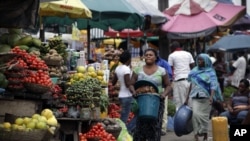One of the great challenges facing the Obama Administration’s efforts to reduce global hunger, poverty and undernutrition, particularly in Africa, is inadequate investment in the agricultural sector, despite the tremendous influx of private investment money flowing to the continent.
We know that the best way to pull a country out of poverty is to invest in agriculture, and we know that a country’s economy will falter if the majority of its population does not have adequate food and nutrition. Changing that equation is a big job, one that needs a concerted effort and investment at every level of government, from donor countries, civil society, and the private sector around the world.
Thus, in May 2012, President Barack Obama announced the G8 New Alliance for Food Security and Nutrition. The goal is to lift 50 million people out of poverty in sub-Saharan Africa by 2022 through inclusive and sustained agricultural growth, in part by matching commitments from African governments to implement key policy reforms with commitments from companies to invest. “Fifty years ago, Africa was an exporter of food,” the President said. “There is no reason why Africa should not be feeding itself and exporting food again.”
The idea is simple: African leaders commit to enacting pro-market reforms; G8 countries commit to maintaining their L’Aquila pledges and aligning support with African countries’ own plans for food security; and private sector companies and financial institutions commit to investments that will help smallholder farmers, many of them women, to improve their agricultural production, access markets, increase their incomes, and improve their nutritional status.
Just one year later, the New Alliance is boasting a number of successes. Today, it is an Africa-led public-private partnership with $3.75 billion in investment intentions from over 70 private sector partners. Thus far, six African countries - Ethiopia, Ghana, Tanzania, Burkina Faso, Cote d’Ivoire and Mozambique - have joined the effort, introducing serious market-oriented reforms, which will help to expand trade, strengthen local and regional markets, and create new jobs. The New Alliance, with leadership from the African Union Commission and support from G8 partners and others, will continue to expand to additional African countries this year. The United States contributes to this global effort through Feed the Future, President Obama’s global hunger and food security initiative.
“Reducing malnutrition and hunger around the world advances international peace and security,” said President Barack Obama. “It's a moral imperative, it's an economic imperative, and it is a security imperative.”
We know that the best way to pull a country out of poverty is to invest in agriculture, and we know that a country’s economy will falter if the majority of its population does not have adequate food and nutrition. Changing that equation is a big job, one that needs a concerted effort and investment at every level of government, from donor countries, civil society, and the private sector around the world.
Thus, in May 2012, President Barack Obama announced the G8 New Alliance for Food Security and Nutrition. The goal is to lift 50 million people out of poverty in sub-Saharan Africa by 2022 through inclusive and sustained agricultural growth, in part by matching commitments from African governments to implement key policy reforms with commitments from companies to invest. “Fifty years ago, Africa was an exporter of food,” the President said. “There is no reason why Africa should not be feeding itself and exporting food again.”
The idea is simple: African leaders commit to enacting pro-market reforms; G8 countries commit to maintaining their L’Aquila pledges and aligning support with African countries’ own plans for food security; and private sector companies and financial institutions commit to investments that will help smallholder farmers, many of them women, to improve their agricultural production, access markets, increase their incomes, and improve their nutritional status.
“Fifty years ago, Africa was an exporter of food. There is no reason why Africa should not be feeding itself and exporting food again.”
Just one year later, the New Alliance is boasting a number of successes. Today, it is an Africa-led public-private partnership with $3.75 billion in investment intentions from over 70 private sector partners. Thus far, six African countries - Ethiopia, Ghana, Tanzania, Burkina Faso, Cote d’Ivoire and Mozambique - have joined the effort, introducing serious market-oriented reforms, which will help to expand trade, strengthen local and regional markets, and create new jobs. The New Alliance, with leadership from the African Union Commission and support from G8 partners and others, will continue to expand to additional African countries this year. The United States contributes to this global effort through Feed the Future, President Obama’s global hunger and food security initiative.
“Reducing malnutrition and hunger around the world advances international peace and security,” said President Barack Obama. “It's a moral imperative, it's an economic imperative, and it is a security imperative.”






